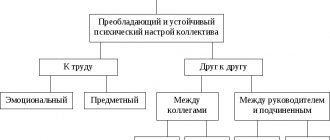History is made by people. Even more - people are history. Almost every person is familiar with the names of Napoleon Bonaparte and Winston Churchill, Pele and Diego Armando Maradona, Marilyn Monroe and John Lennon. All of them, despite the absolute dissimilarity of their occupations, have one thing in common; these people, of course, can be characterized by the word “leader”. The ability to captivate people, to make your idea the idea of hundreds of thousands of others, to accomplish alone what was considered unattainable is worth a lot.
Based on an analysis of the lives of many prominent figures of the past and present, modern science (leadership psychology, sociology, management, political science) is trying to develop a unique quintessence of leadership qualities and skills to help a person unlock his potential and realize himself in life. Leadership development training is in great demand; many companies constantly seek the services of various leadership schools.
We have prepared information about basic theories and styles of leadership, decision making, responsibility, proactivity, self-organization, effective communication, teamwork, and development of leadership potential in general. You will learn about all of the above from the lessons of this training.
What is leadership?
According to one definition, leadership is a process of social influence in which one person can enlist the help and support of others to accomplish common tasks. To study this influence, the phenomenon of a leader as an individual with a set of unique leadership qualities and skills is very important.
Many examples from the lives of famous people (you will read about them below) prove that almost any person, with a certain amount of dedication and effort, can develop leadership abilities. Why is this necessary? Our world is a complex social system that consists of many subsystems, which, in fact, are the spheres of life of any person. Each of these areas has its own leaders and followers, its own hierarchy. This principle applies wherever more than one person is present at the same time, be it work or gatherings with friends.
Therefore, the development of leadership qualities and skills is necessary for those who want to have maximum control and responsibility for events in their lives, and not just go with the flow, but be a leader for friends or colleagues. Success is often associated with leaders. Who doesn't want to be successful today? At the same time, we should not forget that the main thing is not the formal pursuit of leader status, but the development of talents and abilities, which will be the first step towards self-improvement.
The concept of leadership in management
Foreign researchers distinguish between the concepts of leader and manager according to the degree of formal and informal authority. The main difference is in the activities of a manager according to an established management scheme, and a leader – on an intuitive level.
The image of a manager-leader in a particular field of activity depends on his unique leadership style:
- the person has a clear management position, certain qualities, creative abilities, and flexibility in responding to client requirements;
- influencing the group through cooperation, following its interests, and staff’s passion for work;
- generation of ideas and an optimistic attitude to solve non-standard situations;
- tolerance for the shortcomings of the team - an effective leader corrects them;
- creativity when completing tasks;
- showing interest in all aspects of the company’s activities;
- honesty towards the formal leader.
Aggression, self-control, and rationality of a manager-leader are also considered positive qualities. An authoritative person knows how to implement a project, delegate authority to team members, and correctly and consistently organize its work.
Online lessons on developing leadership qualities and skills
The leadership training posted on this website is a kind of methodological guide to the basic methods and principles of self-development of the qualities and skills of a leader with reference to theoretical recommendations and practical advice from leading authors and scientific publications in this direction. Each lesson corresponds to current issues and contains information designed to help in solving the questions raised.
When starting work, it is important to understand that it is difficult to take into account the individual needs of everyone who is interested in training, so it is up to you to determine what is useful and necessary for you. This is convenient to do in our self-knowledge course. If you want to start a theoretical course on leadership, it consists of 5 lessons:
Lesson 1. Leadership Theories and Styles
Leadership is a social phenomenon, the study of which has interested many scientists from different historical eras, from hoary antiquity to the present day. The relevance of studying this issue has led to the emergence of different approaches and interpretations of understanding this phenomenon. The most popular leadership theories are developed within the framework of political psychology, which studies political leadership. Gradually, political leadership became the subject of detailed analysis in political science, where many scientific studies are related specifically to this topic.
Lesson 2. Character Qualities of a Leader
Different cultural and historical eras, a set of political, economic, social conditions and standards of living in society imply the presence of leaders with different character qualities sufficient to solve pressing problems of the activities of a group, class, or organization. The demand for such people is especially high these days, which means the supply is also growing. From this follows the development of a struggle for the place of leader, which can only be taken and retained by those who possess certain leadership qualities.
Lesson 3. Leadership skills
Leadership is determined not only by character traits, but also by skills and abilities that can be learned. By developing these skills and abilities comprehensively, you can achieve good results. These skills determine a person's ability to correctly understand complex situations, make good decisions, and achieve goals alone or with a team. Being a leader means developing systematically, mastering new techniques, methods for managing time and organizing the activities of your team, and constantly learning new things.
Lesson 4. Leadership and Communication
The ability to effectively interact with people (colleagues, subordinates, bosses) is the most valuable tool of a true leader, which will always be in demand in any professional environment. Successful management and leadership involves the use of many techniques and knowledge. For example, in management these are the basics of planning, attracting technological innovations, the possibility of delegation, knowledge of the basics of marketing. But the connecting link in social leadership and at the same time the key to success, as psychology claims, is communication. Regardless of the field of activity, be it a team sport, business or politics, people with developed communication skills have always become the best. We have already mentioned these skills in previous lessons, and now we will look at them in more detail.
Lesson 5. Leader and teamwork
The previous lesson identified the role of communication in the process of establishing effective interaction with people. Now we will look at other skills needed to work successfully in a team and get acquainted with recommendations for organizing group life. Today, in various fields of activity: from working in a large company to developing your own business, the ability to unite a team of, sometimes, very different people and achieve high performance indicators with it is an integral attribute of a leader. That is why many training centers currently offer clients training designed to help participants in collective classes develop the ability to work in a coordinated and coherent manner, raise team spirit, and become familiar with conflict resolution methods. The basis of such classes is role-playing games and group training. Since it is difficult for individuals to achieve the same results as during training in a team, this lesson will not contain practical exercises, we will only focus on recommendations on some important principles for organizing effective team work.
The concept of “leader” and “leadership”
Leadership is the dominance of some group members over others.
The concept of leader means a person who plays a dominant role in the structure of interpersonal relationships. Unlike a leader, a manager is an official person vested with authority and associated with the organization of the main activities of the group. These concepts differ in the scope of problems and the nomination procedure (the leader is nominated spontaneously, the leader is officially appointed).
Signs of leaders:
1) highly active and proactive in solving the group’s main tasks;
2) is able to influence other members of the group;
3) well informed about the problem being solved, about the group members and about the situation as a whole;
4) behavior corresponds to social attitudes, values and norms accepted in this group;
5) has personal qualities that are standard for this group;
6) is able to go beyond recognized norms and standard value orientations.
Leader functions:
1) organization of joint life activities of the group in various areas;
2) development and maintenance of group norms;
3) representation of the group in relations with other groups;
4) accepting responsibility for the results of group activities;
5) establishing and maintaining a group microclimate.
Types of leadership according to M. Weber
:
1) traditional leadership - based on traditions, customs, faith, characteristic of traditional societies (eastern despotism, monarchy). A leader becomes one who belongs to the elite, a narrow group of people;
2) legal-rational (bureaucratic) - based on the reasonableness of existing orders in society. A leader becomes one who has a certain level of knowledge, competence, preparedness, typical for industrial countries;
3) charismatic leadership - based on divinity, supernaturalism, unusualness, appear at turning points in history.
Types of leadership according to real management practice:
1) the leader - organizer - perceives the needs of the team as his own and actively acts. He is optimistic and confident that most problems are completely solvable, he will not propose an empty deal, he knows how to convince, is inclined to encourage, and if he has to express his disapproval, he does so without hurting the dignity of others, and as a result, people try to work better;
2) a leader - a creator - has the ability to see new things, which attracts people. Takes on solutions to problems that may seem insoluble and even dangerous. He does not act by command methods, but invites discussion. Sets the task in such a way that it interests and attracts people;
3) a leader - a fighter - has a strong will, is confident in his abilities, is the first to meet danger or the unknown, and enters the fight without hesitation. He is inclined to stand up for what he believes in and fight to the end. He often acts at his own peril and risk, because he does not have enough time to think about all his actions and foresee everything;
4) the leader - diplomat - relies on excellent knowledge of the situation and its hidden details. He is well informed about all the gossip and gossip, so he knows well who and how he can influence. Prefers confidential meetings in a circle of like-minded people. Allows you to openly say what everyone knows in order to divert attention from your unadvertised plans;
5) a leader - a comforter - is always ready to support in difficult times, respects people, treats them kindly, is polite, helpful, and capable of empathy.
Leadership is also distinguished in the business sphere (“instrumental leadership”) and in the emotional sphere (“expressive leadership”).
Based on stability, they distinguish between situational and permanent leaders.
Characteristics of Group Leadership
There are several components in a group that allow leadership to emerge as a special phenomenon.
Without these components, leadership cannot exist, since each part is integral and significant both for the leader himself and for the members of the group, regardless of its size. The components include the following: business component, emotional, and information elements of leadership. Let's move on to the characteristics of types of leadership depending on which component predominates in each of them. Let's start with business leadership in the group. It is typical primarily for formal groups that solve the most significant production problems. Based on these qualities of task performance, such leadership traits as competence and responsibility are formed, the ability to understand organizational tasks better than everyone else and take effective measures to solve them. Also, a business leader more often than others has experience in the specific field of activity in which he is actually employed.
Finished works on a similar topic
Coursework Leadership in a group 490 ₽ Essay Leadership in a group 250 ₽ Examination Leadership in a group 230 ₽
Get completed work or advice from a specialist on your educational project Find out the cost
The second type of leadership in a group is emotional. It arises in informal groups on the basis of established interpersonal relationships and human sympathies (as well as antipathies). Here it is very important to evaluate the attractiveness of a leader as a participant in interpersonal relationships and a person to whom you can entrust your destiny and making the most significant decisions.
An emotional leader has the following traits:
- It evokes trusting feelings in a person, radiates positive energy, and can, thanks to the skills of psychological analysis, relieve emotional tension in the group;
- An emotional leader is a person to whom each member of the group can turn for help, for sympathy, “cry into your vest, as they usually say in the common people.
As for the information leader, he acts in a sense as the “brain of the group.” They want to turn to this person for help or effective advice, to determine their point of view and understand how best to act, and what is undesirable to do, given the conditions. This type of leader is always erudite; he knows how to explain in simple terms the most complex aspects of life.
— — Do you need help creating a study plan? — Specify a topic and receive a response in 15 minutes — — — — — — get help — —
Note 1
Of course, for a group, the best leader is the one who combines all three of the listed components of leadership, but in practice such a universal leader is quite rare, or he goes through many training stages and combines the knowledge gained from them with his inner charisma and psychological state .








